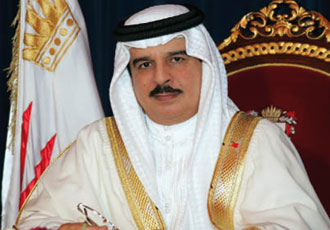
|
 |
 |
|
|
|
|
|
|
|
|
|
|
|
|
|
|
|
|
|
|
|
|
|
|
OHCHR Visit to BahrainThe King Stresses on Transparency
|
 |
On 10 December 2012, in commemoration of Human Rights Day, King Hamad bin Isa Al-Khalifa delivered a speech in which he highlighted several issues with regards to Bahrain’s political and human rights situation including:
Firstly, concerning the Government’s perception of international human rights organizations, and contrary to the common view that these organizations are useless and work against the interest of the country, the King stated that the Kingdom has opened its doors to experts and specialised bodies for the benefit of the country and its citizens. HM pointed out that in order to consolidate this process, the Kingdom hosted a visiting delegation from the OHCHR earlier in December 2012 in order to gain insight into the real situation in Bahrain. This highlights the State's transparency in its open-door policy with all distinguished human rights organisations which seek stability and prosperity for countries.
Secondly, The consolidation of Bahrain’s Human Rights status through the implementation of Bassiouni’s recommendations in a way that would enhance a national cohesion that would lead to the integration of more components of the Bahraini people into the public life as stipulated by the Constitution and the relevant legislations . The reference to the national cohesion and its reinforcement comes in the context of encouraging rapprochement among the various sectors of the Bahraini community and mending the rifts in the social fabric that has been caused by the encroachment of the sectarian element. HM the King affirmed the need for all social segments to maintain positions that promote co-existence. He also called upon all groups to renounce violence and terrorism, affirming that those who think that it is difficult for Bahrain to restore its social cohesion and preserve its national and territorial unity are driven by delusion, illusion and hesitation, which have no place in the solid and brave hearts of the Bahraini citizens.
Thirdly, the King stressed that in a democracy, freedom of opinion and expression, freedom of peaceful gathering, freedom to establish national associations and other approved legitimate constitutional rights are not kind gestures but inalienable rights guaranteed for all people. But he also added that these rights require national and moral responsibility in order to be exercised.
Fourthly, promoting the role of the National Institution of Human Rights (NIHR) and amending its laws so that it is independent and has wider authority in accordance to the Paris Principles. NHIR should play an essential role in the future especially in the areas of protecting human rights, educating the masses and investigating human rights violations as well as bringing people together and participating in developing human rights legislations according to international standards.
It is noteworthy that the NIHR was established in 2009, but failed to fulfil its role so the King ordered its amendment in 2012, and its new members are waiting to be appointed.
Lastly, this relates to supporting civil society institutions. According to the King’s vision, it is important for civil society institutions to play a vital role in spreading the culture of human rights, contribute to the national development process and share with the Government the responsibility of increasing citizens’ awareness of their rights and obligations in a country of law and institutions. He also urged concerned bodies in the Kingdom to provide all required facilities and suitable funding for the civil society institutions’ national projects. HM also added that authors, media personnel and intellectuals should have a greater role in increasing public awareness in order to protect the youth from schism and disunity.